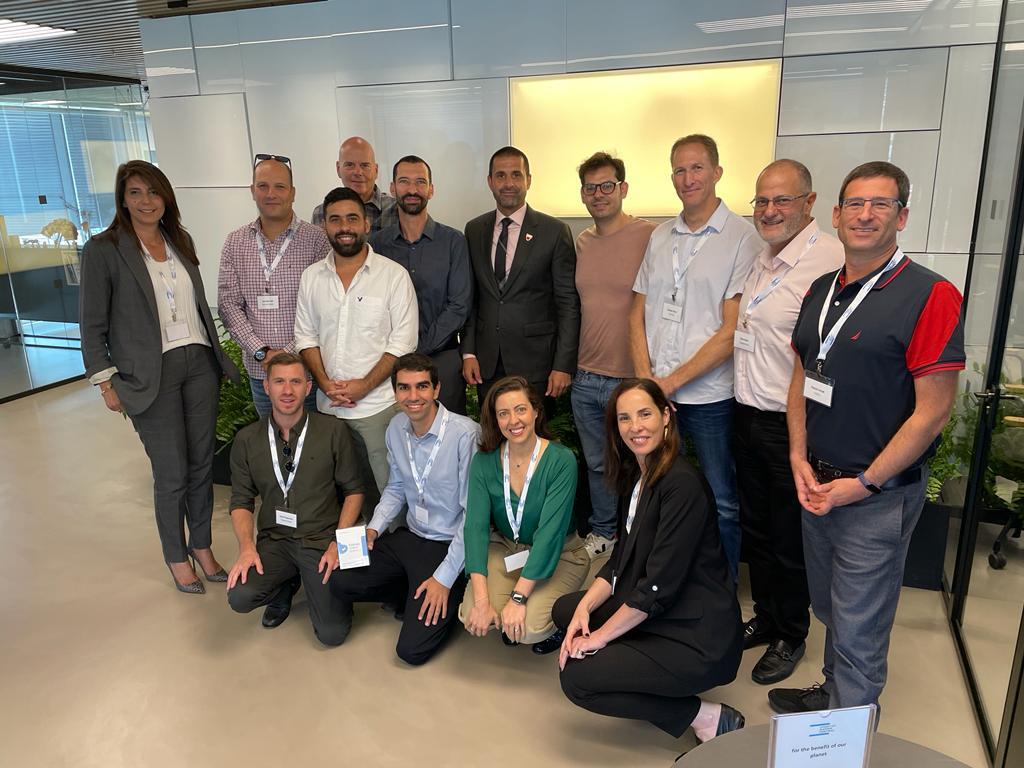Bahraini envoy pitches Israeli companies on operating in Gulf
Ambassador Al Jalahma says low costs and government labor subsidies can make Bahrain a good place for R&D, manufacturing and clinical trials

Start-Up Nation Central
Bahraini Ambassador Khaled Al Jalahma, center, flanked by Israeli executives in Tel Aviv
Touting low operating costs and significant labor subsidies, Bahrain is reaching out to Israeli companies and pitching them on the idea of moving some of their operations to the tiny Gulf nation.
Ambassador Khaled Al Jalahma outlined his government’s intention to set up a regional hub that would cater to the needs of Israeli startups at a July 28 meeting in Tel Aviv with executives from more than a dozen companies.
Bahrain is both “willing and flexible” to help foreign companies get set up, said Yariv Becher, vice president for “innovation diplomacy” at Start-Up Nation Central, a nonprofit organization that promotes emerging Israeli companies, which arranged the meeting. Setting up in Bahrain, Al Jalahma told the executives, can also enable them to tap into broader international labor pools of engineers and other skilled employees.
The Israeli group was assured by the ambassador that “whatever is needed to accommodate the companies will be provided, whether it’s, first, information that they need, and second, help with regulatory issues,” Becher said. “Also to find the right model that would fit an Israeli startup so that it can be hiring tech engineers, or establishing some sort of manufacturing operation or doing clinical trials for healthcare companies.”
The ambassador told the Israelis that his country “is business friendly and our work attitude is tachles,” according to several people present, scoring points with the group by using a Yiddish word that means straight talk.
Israeli executives who attended the meeting said Al Jalahma made a good case for his country as a Middle East hub for sales and R&D. “We want to be very active in the region and Bahrain can be a gateway,” said Rotem Arad, director of business development for H2Pro, an Israeli company that produces so-called “green hydrogen” by splitting water into its component molecules and generating cleaner, renewable energy. Among H2Pro’s investors are Microsoft founder Bill Gates, Japan’s Sumitomo Corp. and Jerusalem-based OurCrowd.
Other companies at the Tel Aviv event, which was sponsored by the Bahrain Economic Development Board, were Addionics, Aleph Farms, Beewise, C2i Genomics, Finteka,, Papaya Global, Minute Media, Monday.com, Scorpio Labs, See Tree, Set Point and Trieye.
Bahrain and the United Arab Emirates both signed the Abraham Accords with Israel at a White House ceremony on Sept. 15, 2020. With a population of about 1.7 million, however, Bahrain’s economy is less than one tenth the size of the UAE’s, and its business potential for Israel has been overshadowed by its Gulf neighbor. One unique attraction, though, is Bahrain’s close proximity to Saudi Arabia – they’re linked by a 16-mile causeway – which has made it a gateway to the Gulf’s largest market.
Both countries are magnets for skilled workers from India and elsewhere in Asia, making them a useful source to help address Israel’s chronic shortage of engineers. Morocco, which signed the Abraham Accords three months after the two Gulf states, has presented itself as a source for employing engineers in Africa.
Becher said the ambassador, the first-ever envoy to Israel from the Gulf nation, was an enthusiastic salesman and promised to follow up on any expressions of interest. “He is very active, willing and eager to get companies to go [to Bahrain],” Becher said. “He talks with them. They ask him specific questions. If he doesn’t have the answer, he writes it down. He’s gonna get back to them. He’s very well-connected.”









